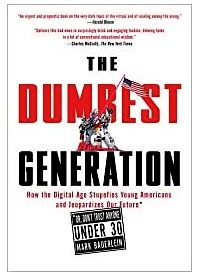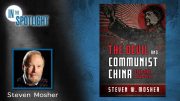
The Dumbest Generation is a book that is painful to read, but which Americans dare not ignore. The book’s title reflects the confrontational character of its findings: Mark Bauerlein addresses a topic that refuses to be ignored, and he does so with a command of the facts and the passion of a jeremiad.
As Bauerlein observes in the “Introduction”: “This book is an attempt to consolidate the best and broadest research into a different profile of the rising American mind. It doesn’t cover behaviors and values, only the intellect of under-30-year-olds. Their political leanings don’t matter, nor do their career ambitions. The manners, music, clothing, speech, sexuality, faith, diversity, depression, criminality, drug use, moral codes, and celebrities of the young spark many books, articles, research papers, and marketing strategies centered on Generation Y (or Generation DotNet, or the Millennials), but not this one. It sticks to one thing, the intellectual condition of young Americans, and describes it with empirical evidence, recording something hard to document but nonetheless insidious happening inside their heads. The information is scattered and underanalyzed, but once collected and compared, it charts a consistent and perilous momentum downward.”
What Bauerlein documents is that it is not that the educational system has failed to keep children busy — the school day is filled with frenetic activities — but that the system fails to accomplish the one thing which rests at the heart of its charter: schools fail to teach. Trained to make use of the most up-to-date information technologies, many modern students are unable to retain and assimilate such information, and one of the most important elements of an education — the ability to apply past lessons and events to present concerns — is almost entirely outside of their grasp.
Bauerlein masterfully interweaves anecdotal incidents and statistical studies throughout The Dumbest Generation, which serves to magnify the impact of the work on the reader. For example, while demonstrating the bibliophobia of the rising generation, he dismisses the claim “at-least-Harry-Potter-has-kids-reading” with the statistical demonstration that not only is the rate of reading in precipitous decline, but the depth of material read is also markedly degraded: “The percentage of 17-year-olds who ‘Never or hardly ever’ read for fun more than doubled from 1984 to 2004, 9 percent to 19 percent. Over the same period, the percentage of 17-year-olds who read for fun ‘Almost every day’ dropped by 9 points. Nearly half of high school seniors (48 percent) read for fun ‘once or twice a month or less.’” When Bauerlein asks, “Has the undergraduate plan become so pre-professionalized that the curriculum functions as a high-level vocational training that dulls the intellectual curiosity that encourages outside book reading?,” the reader knows the answer. True education has little place in the institutions that Russell Kirk once dubbed “Behemoth University.”
Bauerlein’s evaluation of online learning and the over-use and misuse of technology in education deserves a more lengthy review that can be allotted here. Reviewing the evidence at his disposal, Bauerlein is largely dismissive of the educational benefits of online study and cites studies that demonstrate that such research may actually damage the student’s overall ability to assimilate information. “Nonlinear, nonhierarchical thinking sounds creative and individualized, but once the Web dominates a student’s intellectual sphere, does it change value, sliding into a destructive temptation to eschew more disciplined courses of thinking, to avoid reading a long poem line by line, tracking a logical argument point by point, assembling a narrative event by event…? The other effects, too, might prove harmful. If students grow up thinking that texts are for interactivity — to add, to delete, to cut and paste — do they acquire the patience to assimilate complex texts on their own terms, to read The Illiad without assuming that the epic exists to serve their purposes?” In fact, studies demonstrate that very little reading goes on with the Internet at all; for the most part what takes place is superficial skimming which utterly undermines the reader’s ability to meaningfully engage the text. The deterioration of any capacity for critical reading and thinking will echo throughout the broader culture: “The habits young people form after school, on weekends, and over the summer are pleasing — fast scanning, page hopping, sloppy writing, associative thinking, no unfamiliar content — and while they undermine the values and demands of the classroom and the workplace (scrupulous reading, good grammar, analytical thinking), these habits won’t go away.”
The problems highlighted by The Dumbest Generation demand a response; even if one is critical of the extent to which the author presses his argument, it is difficult to honestly contend with the underlying thesis. There have been, and will continue to be, many who will pander to the vanity of the young and praise them for their presumed technological prowess and “hard work.” As Cervantes observed, the proof of the pudding is in the eating. The results of the ongoing miseducation of the young is statistically demonstrable and anecdotally seemingly omnipresent in the semiliterate ramblings of MySpace and other forums.
Bauerlein declares in his conclusion: “It’s time for over-30-year-olds of all kinds to speak out, not just social conservatives who fret over Internet pornography, or political Leftists who want to rouse the youth vote, or traditionalist educators who demand higher standards in the curriculum. Adults everywhere need to align against youth ignorance and apathy, and not fear the ‘old fogy’ tag and recoil from the smirks of the young. The moral poles need to reverse, with the young no longer setting the pace for right conduct and cool thinking. Let’s tell the truth. The Dumbest Generation will cease being dumb only when it regards adolescence as an inferior realm of petty strivings and adulthood as a realm of civil, historical, and cultural awareness that puts them in touch with the perennial ideas and struggles.” In short, the struggle continues to be for what T. S. Eliot memorably called “the permanent things.” Pursuing data instead of truth, the rising generation is in mortal danger of losing both the facts and their implications and such a loss threatens the entire fabric of the American Republic.
Mark Bauerlein, The Dumbest Generation — How the Digital Age Stupefies Young Americans and Jeopardizes Our Future, (New York: Tarcher/Penguin, 2008 [hardover] and 2009 [paperback])



